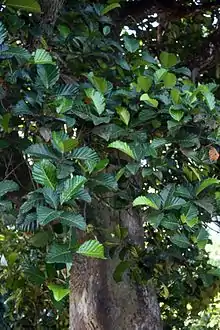Artocarpus nobilis
Artocarpus nobilis, the Ceylon breadfruit, is a tree species in the family Moraceae. It is endemic to south western regions of Sri Lanka. It is known as "Wal dhel - වල් දෙල්" , "Baedi dhel - බැදි දෙල්" or as "Hingala dhel - හිංගල දෙල්"[3] by local people.
| Ceylon breadfruit | |
|---|---|
 | |
| Scientific classification | |
| Kingdom: | Plantae |
| Clade: | Tracheophytes |
| Clade: | Angiosperms |
| Clade: | Eudicots |
| Clade: | Rosids |
| Order: | Rosales |
| Family: | Moraceae |
| Genus: | Artocarpus |
| Species: | A. nobilis |
| Binomial name | |
| Artocarpus nobilis Thwaites | |
| Synonyms | |
| |
The plant is known to infect by Rigidoporus microporus to cause White root disease. This is the first time that the pathogen was found instead of Hevea brasiliensis.[4]
Description
Ceylon breadfruit is an evergreen plant with about 25m height. The seeds and fruits are used for medicinal purposes for the worm diseases caused by nematode Ascaris lumbricoides.[5]
Chemistry
Artocarpus nobilis contains prenylated flavonoids, xanthonoids in its root bark,[6] geranylated phenolic compounds in its fruits,[7] geranyl chalcones in its leaves[8] and pyranodihydrobenzoxanthones isolated from the bark.[9]
References
- World Conservation Monitoring Centre (1998). "Artocarpus nobilis". IUCN Red List of Threatened Species. 1998: e.T30865A9578329. doi:10.2305/IUCN.UK.1998.RLTS.T30865A9578329.en. Retrieved 17 November 2021.
- "Artocarpus nobilis Thwaites — the Plant List".
- "Biodiversity of Sri Lanka: වල් දෙල්/බැදි දෙල්/හිංගල දෙල්[Wal del/Bedi-del]/Hingala-del (Artocarpus nobilis)". 2012-06-17.
- Madushani, HKI; Fernando, Thps; Wijesundara, RLC; Siriwardane, D. (2014). "First Report of white root disease of Artocarpus nobilis in Sri Lanka caused by Rigidoporus microporus". Journal of the National Science Foundation of Sri Lanka. 42 (2): 197. doi:10.4038/jnsfsr.v42i2.6998.
- "Ayurvedic Plants of Sri Lanka: Plants Details".
- Four new prenylated flavonoids and xanthones from the root bark of Artocarpus nobilis. Jayasinghe U.L B., Samarakoon T.B., Kumarihamy B.M.M., Hara N. and Fujimoto Y, Fitoterapia, 2008, volume 79, no 1, pages 37-41, INIST:19972501
- Geranylated phenolic constituents from the fruits of Artocarpus nobilis. Jayasinghe L, Kalinga Rupasinghe G, Hara N and Fujimoto Y, Phytochemistry, 2006, volume 67, no 13, pages 1353-1358, INIST:18043180
- Geranyl chalcone derivatives with antifungal and radical scavenging properties from the leaves of Artocarpus nobilis. Jayasinghea L., Balasooriyaa B.A.I.S, Chintha Padminia W., Hara N and Fujimoto Y, Phytochemistry, May 2004, Volume 65, Issue 9, Pages 1287-1290
- Two pyranodihydrobenzoxanthones from Artocarpus nobilis. M. Uvaisa, S. Sultanbawaa and Sivagnanasundram Surendrakumar, Phytochemistry, Volume 28, Issue 2, 1989, Pages 599-605
